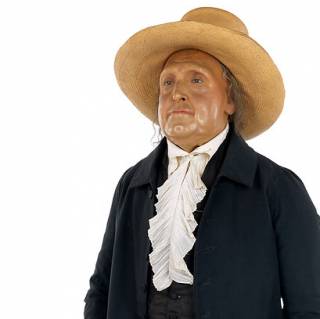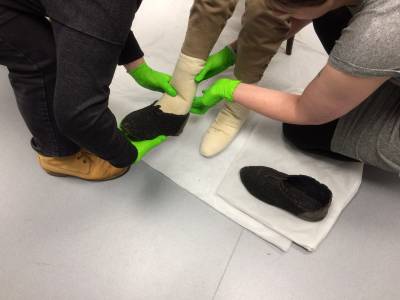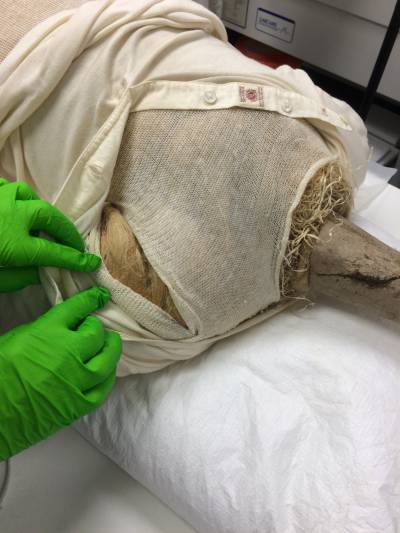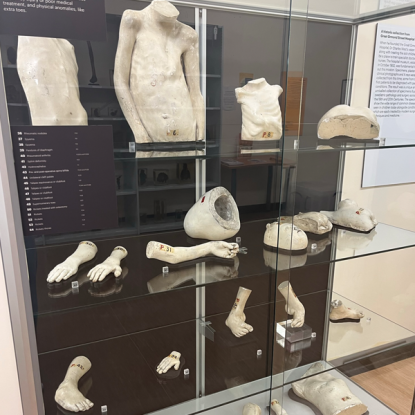Jeremy Bentham to feature in New York's Met Breuer exhibition
After much preparation and keeping of secrets, we can now finally reveal our exciting news!

The auto-icon of Jeremy Bentham which usually resides in the South Cloisters of UCL's main building, will be travelling to New York to be a central part of The Met's exhibition, Like Life: Sculpture, Color and the Body, 1300-now. This will be the first time since Bentham's death 180 years ago that the auto-icon will leave UCL.
The exhibition will bring together sculptures of the human form by a wealth of well-known artists including Rodin, Degas, Louise Bourgeois and Jeff Koons, documenting 700 years of sculptural practice from 14th century Europe to the present.

Organising a loan like this is, though hugely exciting, is also months in the making. Our collections team have been hard at work preparing the auto-icon for departure next month (March), undertaking a full inspection and spring clean, revealing his underwear for the first time for more than 20 years. It is thought the only time before that may have been during the war.
Jayne Dunn, Head of Collections Management confirmed, “He is wearing the original underwear (which has not got infested) and two sets of stockings, one over the other. That might have been the fashion then. Over the top he has a vest which is the original.”.
Indeed, the first task was to check Bentham for infestations. “We don’t want to send an object to another museum and infect their collection with pests. The first thing we had to do was to discover whether he was suffering from any infestations. If he had been we would have had to fumigate him,”.
The skeleton is padded with linen tow, which resembles wood wool, held in place by a large stockinet over the body which was replaced in the 1990s after being damaged by an infestation. It is thought the original jacket and trousers were also replaced in the Second World War by UCL curator Violette Lafleur after being eaten by pests. “Carpet beetles love wool but they are less keen on linen which is why we think the vest, underpants and stockings have survived,” said Jayne.
Bentham’s stuffing had also lost its shape with a large lump protruding from his back which required remedial work. Our collections curator Subhadra Das explained “When you have an old sofa everything settles into the bottom and you have to plump up the cushions,”. “Well the same thing happened with Bentham. We have not added anything but reapportioned where it is so he looks a lot slimmer. He has a strong core now.”

The team took advice from specialist art transporters on the safest way to pack Bentham who recommended he be placed on his back in a seated position to minimise stress on the fragile bones. One crate, shaped inside like a chair, will be used for Bentham, while a separate crate will carry his coat as well as his hat, wax head, chair and cane – all of which are thought to be the originals. “One of the things that made him eccentric is that he gave names to things, so he called his walking stick Dapple, or Dobbin,” said Subhadra.
The final preparations for his departure will begin in early March when he comes off display at UCL. Jayne Dunn and Emilia Kingham, a UCL conservator, specialising in human remains, natural history and wet specimens, will travel with the crated auto-icon to New York.
Bentham always had an ambition to go to America, and now for the first time he will. We'll wish him a warm farewell at our event A Wake for Jeremy Bentham tomorrow night, Thursday February 15, Bentham’s 270th birthday.
The preserved head of Jeremy Bentham will remain on display for two more weeks as part of our current Octagon exhibition What Does it Mean to Be Human? until 28 February.
 Close
Close



